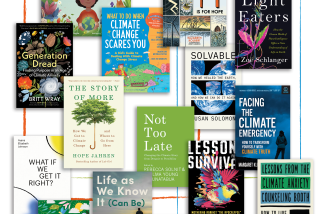For My Adopted America: Love, Worry and Hope
- Share via
I find myself worrying more and more about my adopted country. It may be because I am burdened by memories of the past.
We landed in New York in March of 1948. We had left England after witnessing the Battle of Britain, listening to Winston Churchill’s calls for greatness and celebrating victory. But my Polish-born wife and I knew that the only future for us and our Scottish-born children was on the other side of the Atlantic.
So we embarked on a journey into the unknown. We were lucky. We still are. So why do I worry?
We both desperately wanted to see the idealized America. Not long after our arrival, I sat on a dais alongside President Truman, listening to him discuss the Marshall Plan. Later, I met Secretary of State Dean Acheson. A decade into our stay in this country, I became--unbelievably, proudly--a Foreign Service officer. Then we observed President Kennedy’s dream of a just as well as powerful America. We were at our post in Korea when we learned of his death, and we despaired about the future.
But the future turned out to be bright. A man from Texas, viewed at first as primitive and limited, initiated the Great Society. Racial equality was put on the national agenda. After stumbling in foreign policy--Vietnam--President Johnson decided to step down.
In the meantime, social and economic progress continued at home. Affirmative action opened doors for youngsters from poor neighborhoods to enter the educated elite.
Why, therefore, am I burdened by the past?
I am burdened by it in comparing it to the realities of today. The new administration appears to be set on undoing all that has been built. Domestically, we are entering into a phase of a new type of diversity: rewarding business interests at the expense of everyone else. The visible alienation of minorities, women, labor unionists and others is surfacing.
The world looks with dismay at President Bush’s decision not to support the Kyoto Protocol--in effect, to remove our country from the crusade to save the planet from overuse. Our traditional allies are rebuffed and in some cases insulted. Forgetting his narrow mandate, Bush appears to be moving the country into a new cocoon of self-centeredness.
So I am worried. Worried that the United States may one day, long after my generation disappears, cease to be a nation of equal opportunities. Worried that the status of great power, so rightly deserved, may slip away from Washington.
Men and women of the world either fighting their limited wars or fighting poverty and for access to health care are bound to look elsewhere for assistance and friendship.
That would probably satisfy the right wing of the Republican Party. But it could destroy the notion of the American dream, the same dream that brought my family here more than a half-century ago.
Yet I don’t see any society, any country, any continent, that could replace the role the United States has played during its most recent history, as a great power and a compassionate society.
So I have hope. Hope that the people of this country, even though immersed in their own often parochial problems, will be wise enough to reverse the trend.
More to Read
Get the L.A. Times Politics newsletter
Deeply reported insights into legislation, politics and policy from Sacramento, Washington and beyond. In your inbox twice per week.
You may occasionally receive promotional content from the Los Angeles Times.










